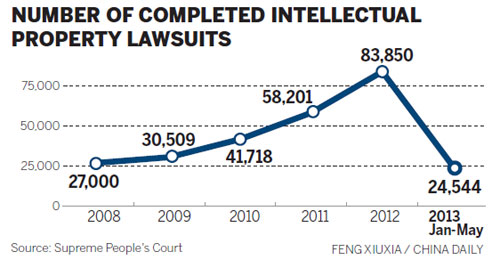
 |
Lang Guimei, a senior judge with the top court's intellectual property tribunal, said courts are also handling more foreign-related IPR cases involving international trade conflicts.
"The parties involved usually fight each other through cross-border IPR lawsuits to compete for trade benefits," she said, without elaborating.
Li Li, a member of the China Lawyer Society who specializes in cross-border IPR cases, said that the tendency of trade protectionism in some countries amid a sluggish global economy might contribute to the rise.
She said IPR could be used as a tool to implement trade protectionism and a weapon of transnational enterprises to deter Chinese enterprises from going global.
Faced with rising IPR cases involving overseas companies, Kong said, Chinese judges are under pressure because of the complexity of such cases and the huge impact the ruling might bring to the litigants.
"With rapidly developing technology, it's difficult to clarify some of the technical facts, particularly in high-tech sectors such as biology, chemistry, pharmaceutical, electronics and telecom," he said.
And the verdicts might have huge a impact on the litigants or be vital for a company's survival, he said.
To better handle rising IPR cases, Kong called for more up-to-date legislation on IPR protection and setting up more IPR courts specializing in such cases across the country.

















 In pictures: history of China's auto industry
In pictures: history of China's auto industry


![]()
